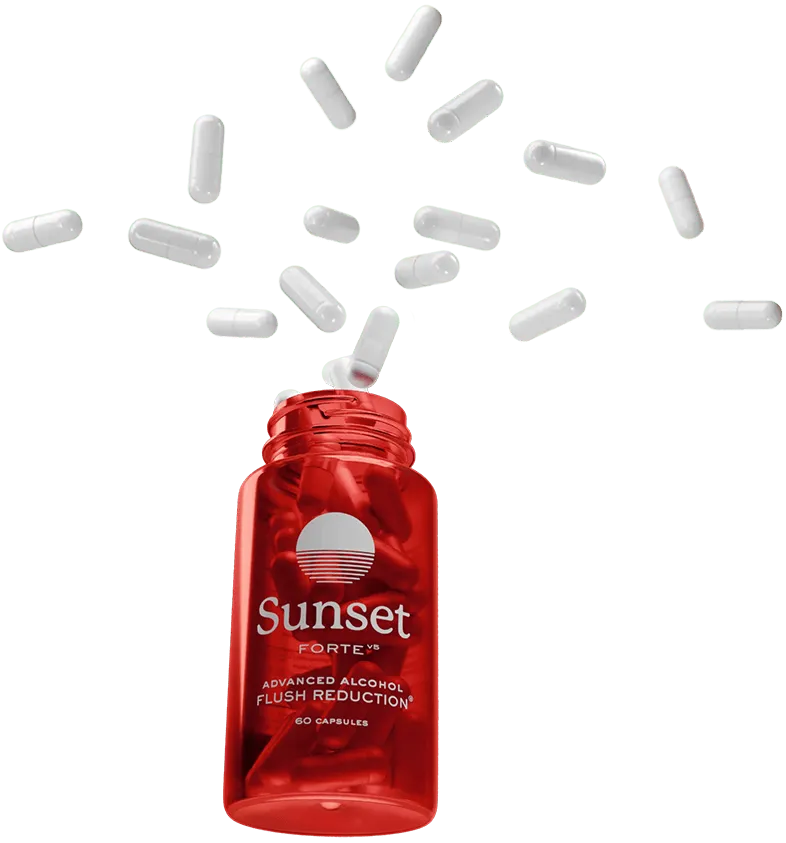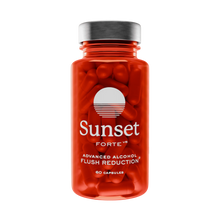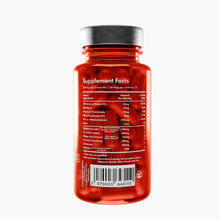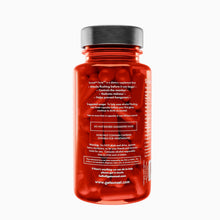Microplastics in Alcohol: A Hidden Risk for ALDH2 Deficient Drinkers

- Microplastics in alcoholic beverages
- It's more widespread than you think
- Health risks of microplastics
- ALDH2 deficiency makes it worse
- Reducing microplastic exposure for ALDH2 deficient people
Share this article
Copy and paste this link
We know what you’re thinking, “Surely not in my beer too?” Unfortunately, there are indeed microplastics in our beer, wine and many other alcoholic beverages too. How did they get there? Are they really that bad for us? And is there anything we can do to minimise our exposure? These are some of the questions we’ll aim to cover in this article, along with a special look at how people with ALDH2 deficiency (aka Asian flush) are particularly affected by these annoying little plastics in our drinks.
What are microplastics and how are they getting into my alcoholic beverages?
Microplastics are tiny pieces of plastic that come from the deterioration of bigger plastic things like bottles, plastic tubing and packing material. Because the pieces are so small, they can easily slip into the production processes of a lot of the food and drinks that we consume, even our alcoholic beverages.
A study titled "A microscopic survey on microplastics in beverages: the case of beer, mineral water, and tea" takes a paritcularly sobering look at the widespread contamination of microplastics in alcoholic and non-alcohol beverages. The research points out that beer typically contains 20 - 80 microplastic particles per litre! They go on to list various sources such as raw materials, atmospheric deposition, and contamination from tools and containers used during production and packaging.
It’s not just beer, but wine and spirits too. Microplastics are getting into these alcoholic drinks at almost every stage of the production process:
- Water Sources: As water is a key ingredient in most alcoholic beverages, any contamination in the water could introduce microplastics into the final product.
- Raw Materials: Ingredients like grapes, barley and hops could be contaminated with microplastics from environmental exposure during cultivation and harvesting.
- Production Equipment: Equipment used in distillation, brewing and bottling processes, especially if made from plastic components, can be a source of microplastic contamination.
- Packaging Materials: Plastic bottles, caps, and liners in metal cans can leach microplastics into drinks.
- Storage / Aging: When alcohol is storied or aged in platic, fibre glass or even plastic lined metal drums, the chance of microplastic contamination is increased.
There are clearly many ways that microplastics can enter our drinks. The degree of contamination may depend on things like specific equipment being used and the type of alcoholic beverage in question.
How widespread is this problem?
Is it just a select few brands that are cutting corners? Or is it a more widespread problem?
Unfortunately, the content of microplastics in our alcoholic beverages is more a problem of human negligence than malpractice. In fact, unless a particular manufacturer is going out of their way to specifically avoid plastic exposure, it’s probably safe to assume that most alcohol is indeed contaminated with microplastics.
A 2018 study published in Food Additives & Contaminants: Part A analysed 24 brands of German beer and found microplastic contamination in all of the samples they tested. Only slightly alarming if you’re not a big beer drinker, but a chilling indicator that microplastics may be finding their way into most of our alcoholic beverages.
To make matters worse, the presence of alcohol can actually accelerate the leeching of harmful toxins from plastics. DEHP is a widely used plasticiser that can leach from plastic materials into liquids. This leaching is accelerated by alcohol due to its solvent properties, which can make it easier for DEHP to absorb into liquid from plastic containers, tubes, lining, etc.
For example, strong spirits that are distilled in plastic, fibreglass or plastic lined metal vessels might contain higher amounts of DEHP and other contaminants than if distilled in a non plastic material. The same would apply to the tubing used to transport the liquid and many other points along the production line.
It is particularly sobering to say that microplastics are certainly finding their way into out bodies from our alcoholic beverages. The next question becomes whether it’s as big a deal as it sounds.
How bad is microplastic exposure for me?
One way microplastics can be bad for us is that they contain chemical contaminants. In 2020, a report by the Endocrine Society and the International Pollutants Elimination Network (IPEN) warned emphatically that plastics (including microplastics) contain and leach hazardous chemicals, including endocrine-disrupting chemicals (EDCs) that threaten human health.
A 2021 study by the Hull York Medical School and the University of Hull also found that microplastics in contaminated food and water can harm human cells. These effects included cell death, immune responses, membrane disruption, oxidative stress, and even damage to the genetic information within our cells.
Microplastics can also cause actual physical damage to tissues, particularly in the digestive tract, potentially leading to gut inflammation and disruption of the microbiome, which is crucial for overall health.
As you can see, microplastics are not only in everything (including our alcoholic beverages), but they’re also not very good for us for a variety of different reasons. Moreover, it turns out that if you’re one of our unlucky readers that flushes red from alcohol, microplastics might pose an even greater risk to you.
Can having ALDH2 deficiency make things worse?
If you’re someone who gets a red face from alcohol, you most likely have a deficient ALDH2 enzyme. If you’re deficient in this enzyme, acetaldehyde can accumulate in your system and potentially cause a higher sensitivity to microplastic toxicity.
Here are a few reasons why ALDH2 deficient people might be more susceptible to microplastic toxicity:
- Microplastics can cause oxidative stress. This happens when there are too many harmful molecules, called reactive oxygen species (ROS), and not enough antioxidants to neutralise them. In ALDH2-deficient individuals, the already elevated oxidative stress from acetaldehyde accumulation can be made even worse from microplastic exposure.
- The presence of microplastics can trigger an immune response, leading to inflammation. People with ALDH2 deficiency are already dealing with acetaldehyde related inflammation, so the two together can be a double whammy.
- ALDH2 deficient individuals might also have a reduced capacity to detoxify harmful substances. The added burden of microplastics may overwhelm their detoxification systems, leading to greater health risks.
What can be done to reduce the risk of microplastic exposure for ALDH2 deficient people?
There are several things ALDH2 deficient people can do to minimise their heightened sensitivity to microplastic exposure.
General microplastic avoidance
ALDH2 deficient people should probably follow general guidelines on reducing overall microplastic exposure. This would include such things as avoiding plastic bottles, filtering drinking water, limiting processed foods, choosing natural fibers, minimising the use of personal care products with microplastics, and reducing overall environmental exposure.
You can also find many specialists who are vocal about how to minimise microplastics exposure. For more than three decades, UC San Francisco Professor of Obstetrics and Gynecology and Reproductive Sciences Tracey Woodruff, PhD, MPH, has researched how the toxic chemicals that surround us in modern life make us sick, like those in microplastics. In a 2024 article, Tracey expands on many of the above suggestions and provides some relevant further reading on how to limit their dangers.
Detoxify acetaldehyde
As mentioned above, the combined negative effects of acetaldehyde and microplastic exposure go together to make life particularly hard for ALDH2 deficient individuals. Helping the body detoxify acetaldehyde can lighten to load on the body’s detoxification mechanisms and reduce overall oxidative and inflammatory stress.
People with ALDH2 deficiency often use N-Acetylcysteine (NAC) and S-Acetyl Glutathione (SAG) based supplements like Sunset to assist the body in breaking down acetaldehyde and lighten the load for it to detoxify other toxins like those from microplastics.
Conclusion
Unfortunately, because of what largely seems to be human oversight and negligence, we are finding more and more microplastic in the foods and beverages we consume on a daily basis. Alcoholic beverages like beer, wine and spirits are no exception, with alcohol having been found to accelerate the leeching of certain harmful toxins like DEHP. The toxins that leech out of microplastics, and the plastics themselves, are indeed harmful for humans and can also pose an even higher risks for individuals with ALDH2 deficiency. A broader awareness of the dangers of microplastics is essential for everyone, inducing the various ways we can reduce our exposure.
Enjoy drinking again and get Sunset Alcohol Flush Support for
33% off while stocks last!
What’s inside?
We use a pharmacist-formulated blend of Glutathione, Dihydromyricetin, Cysteine, L-Theanine, & B Vitamins to stop alcohol flushing before it can begin.
Learn more
94% of people who try Sunset are satisfied with the results.











